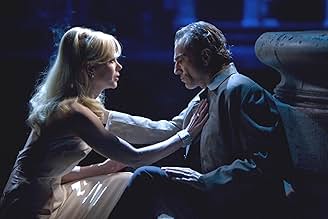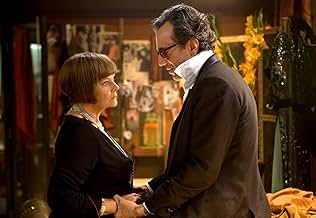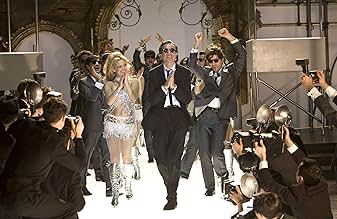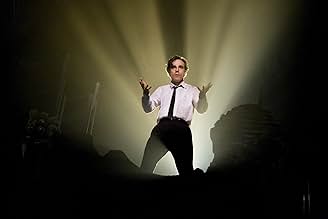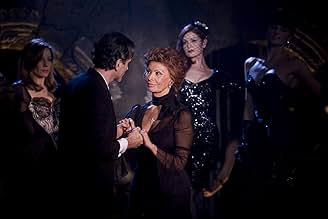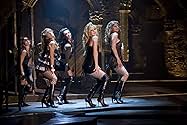Il celebre regista Guido Contini fatica a trovare l'armonia nella sua vita personale e professionale per via dei suoi rapporti con la moglie, l'amante, la musa ispiratrice, l'agente e la mad... Leggi tuttoIl celebre regista Guido Contini fatica a trovare l'armonia nella sua vita personale e professionale per via dei suoi rapporti con la moglie, l'amante, la musa ispiratrice, l'agente e la madre.Il celebre regista Guido Contini fatica a trovare l'armonia nella sua vita personale e professionale per via dei suoi rapporti con la moglie, l'amante, la musa ispiratrice, l'agente e la madre.
- Regia
- Sceneggiatura
- Star
- Candidato a 4 Oscar
- 8 vittorie e 60 candidature totali
Recensioni in evidenza
The film hands down is a wonderful homage to Federico Fellini, in his visual style, the women chosen represent Fellini's size of aesthetic view just like Kidman reminds you of young Anita Ekberg, Cotillard has the same diva material as Anouuk Aimee and Kate Hudson the figure and pallet of American stars that pleased Il Maestro Fellini. If you are familiar with this wonderful director, you'll enjoy "Nine" the better.
Then, I believe music helps to boost the theme and moral of the story. Generally outlined the whole musical is an ego-fest, all around Guido, Guido, Guido, his mess, his women, himself over himself. His ego being put into the light, with each song sprouting in the exact moment with "joie de vivre" and vitality, the women from Kidman to Dench showcasing enormous femininity and composure.
"Les Folies Bèrgere" piece says it clearly. What you need is the laughter, the lights, the color. The music, the "pleasure of living". Nine has it, it has it all while at the same time plays the keys that Maestro Fellini would have liked to hear if he was still with us.
I am at a disadvantage because I didn't see the musical, but quite a bit was cut from the score, which is a shame. The music is wonderful and probably was meant to be sung a little better than it was in the film.
"Nine" is the story of a great filmmaker, Guido Contini, who is about to make another film but doesn't actually have another one. His life is a mess - a wife, a mistress, no script, and no inspiration. He has to come to grips with his immaturity, his women, and with the reality of his life before he can move on.
Each of Guido's women has a song that expresses her feelings, the most famous of which is "Phone Call from the Vatican," sung by Carla (Cruz). This number was performed by the late Anita Morris on stage and considered very risqué. For me, the best filmed number in the whole film was "Cinema Italiano," done by Kate Hudson, and Judi Dench does a great job with the "Folies Bergere" number. "Unusual Way" is perhaps the prettiest song in the score, and that was done by Nicole Kidman.
We don't get much of a chance to know the women in Guido's life with the exception of Luisa (Cotillard) who gives a lovely, gentle performance as a woman who loves her husband but is continually hurt by him, and Carla, who despite her overt sexiness, is actually very fragile. And we get to know Lilli, the costumer, who knows Guido very well indeed and is the voice of reason.
The movie is pretty to look at, and the women are absolutely stunning, particularly Cotillard, Kidman, and Cruz, who looked like goddesses. Daniel Day-Lewis lived in Italy for a while and his accent is excellent. He's handsome and sexy, possibly more introverted than one of the stage Guidos - Raul Julia, Antonio Banderes, Sergio Franchi, or John Stamos.
Since this film moves slowly in parts, it's curious that so many songs were left out.
In the final analysis, though I liked parts of "Nine," I think it's too theatrical a show to lend itself to film. As a theater piece, it's fabulous - the original show was a hit, as was the revival.
I know some people hated this movie, but it's not awful. It's just not great.
Performances: Let me first say that no actress delivered any less than they possibly could, and you could tell that the cast had worked their butts off during production.
The Great- Marion Cotillard in particular delivered what is sure to be one of the most understated performances in recent memory, as well as delivering the two most powerful and emotional numbers in the show. Penelope Cruz was SEXY, and as her character's story was wrapped up she beautifully portrayed a "mistreated mistress," so to speak. Judi Dench was fantastic as the background player in Guido's career, perfectly delivering wit while supporting her friend. Most importantly, these three worked so well because they were interlinked in each other's story, and as a result their plot lines flowed well into each other.
The OK- DDL and Sophia Loren were fine in their parts, simply filling out their roles and not seriously improving on or dragging down the movie in any way.
The Misused- Nicole Kidman, Kate Hudson, and Fergie were all criminally misused, although fantastic when on the screen. All three had stories that didn't synch with the movie, whether they be Kidman (who honestly needed a more fleshed out role that came in contact w/ other characters other than just Guido), Hudson (whose number really felt like it would have made more sense in the beginning of the movie), or Fergie ("Be Italian" felt shoehorned in and disconnected, and would have been a perfect opener or closing number). All three felt particularly disconnected from the film.
I can honestly say that not one of the players in Marshall's cast disappointed, but it was Marshall himself and the messy script (irony!) that jumbled up the movie and left me with a very disjointed, disconnected result. Each scene was Oscar-worthy, but they were only partially threaded together into a cohesive story.
The original movie was a phantasmagoric blending of memory, reality and wish-fulfillment fantasy, focused on a major Italian film director caught in creative crisis (a figure obviously based on Fellini himself). Daniel Day-Lewis takes on the role, made famous by Marcello Mastroianni, of the filmmaker (now named Guido Contini) who "has nothing left to say" - either as a man or as an artist - a man so harried and hounded by producers, subordinates, reporters, detractors, sycophants, and assorted hangers-on that he sneaks away for a rest-cure at an out-of-the-way health spa. With all his creative juices dried up and feeling that he will have a nervous breakdown if he has to make even one more statement or executive decision regarding his film, Guido, like many of us, believes he will find the peace he so desperately yearns for by retreating from the outside world. But Guido soon discovers that there is no escaping from the people and pressures of the world in which we live - nor from our religious and familial upbringing - for they are each of them an integral part of the fabric that makes us who we are.
Visually, "Nine" captures all the flash, dash and excitement of life among the glitterati in the Eternal City circa 1965. In terms of plot and incident, the Michael Tolkin/Anthony Minghella screenplay (itself derived from Arthur Kopit's Broadway adaptation) follows the original fairly closely, but what's missing is the spark of cinematic genius that Fellini alone could bring to the material. But can one reasonably have expected that, anyway? As a director, Rob Marshall does an impressive job re-staging the dramatic portions, but he certainly doesn't have Fellini's flair for the carnival-like atmosphere that became a signature feature of all his later works (but, then again, who does?). However, as he did in "Chicago," Marshall demonstrates that he knows how to slide in and out of the musical numbers without being unduly jarring about it. That's particularly challenging given that most of the numbers - which serve as reflections of the characters' thoughts and feelings and the movie's themes - are done largely on surrealistic soundstages, as opposed to the on-location filming of the non-musical portions of the movie.
No surprise, Day-Lewis is superb as the dashing but world-weary director (truly as much a celebrity as an artist), perfectly capturing the angst, frustration and conflict taking place deep within the soul of a creator who still has so much to say - despite his protestations to the contrary - but not the slightest clue of how to say it. Guido is clearly trying to be a good person, but all those inner demons are doing their best to thwart him at virtually every turn. There are many moving moments of deep introspection, as Guido contemplates the direction of his life and the effect his actions are having on the people he loves. I'm going to go out on a limb here, and it may sound like blasphemy even to say this, but Day-Lewis lets us see his character's pain in a way that even Mastroianni himself did not. Interestingly, by tamping down some of Fellini's cinematic "distancing devices" and icy-cool tone, the movie actually allows us to relate with Guido on a more personal level and to care more deeply about his plight.
Marion Cotillard replaces Anouk Aimee as Guido's devoted but long-suffering wife who knows about her husband's infidelity and who suspects he has become a filmmaker as a means both of avoiding having to deal with real life and of achieving personal forgiveness and redemption for himself; Penelope Cruz stars as Guido's flighty mistress, whose sudden appearance at the spa throws Guido's world into a tizzy; and Sophia Loren puts in an occasional appearance as Guido's recently deceased mother who gives him words of advice and comfort from beyond the grave. Nicole Kidman portrays Claudia, the beautiful young starlet who loves Guido but ultimately refuses to be just another of his numerous "conquests." Judi Dench plays the fashion designer who appears to be the one level-headed and brutally honest person whom Guido can turn to for advice and support. And all of them are excellent.
One thing that "Nine" has going for it that "8 ½" didn't is the perspective that comes with the passage of time. When the original was released, it WAS "Italian Cinema" - and everything that went along with that term. As a result, the movie was totally unconscious of itself and the place it and other films of its time period would occupy in movie history. "Nine," with the ability to look back on the era from a much later perspective, is able to convey all this in a way that those earlier films, including "8 ½" itself, could not. In this sense, "Nine" sees "8 ½" more as an artifact than as the contemporary trailblazer it was in its time.
As with all remakes and "re-imaginings" of classic works, we must finally ask ourselves the crucial question: "Is this trip really necessary?" I think in the case of "Nine," I will have to go with "Yes" - or, if not "necessary," at least audacious and stimulating. "8 ½" aficionados and Fellini purists may have trouble warming up to this version, but I see it not as a denigration of the master and his great work, but as a tribute to them.
Lo sapevi?
- QuizWhen it was decided to make a play out of Federico Fellini's 8½ (1963), the rights were easy to obtain from Fellini; his only condition was that neither his name nor the title 8 1/2 should be connected to it.
- BlooperWhen Guido drives up to the Cinecitta film studios in his open top Lancia with his producer as passenger, parked outside (to left) is a (quite distinctive) two tone white and blue paint job rear-engined (flat front radiator) car (another Lancia?): as soon as they pull up inside the lot, as they exit the car and walk around the lot, camera pulls back to show an exact same (license plate same /similar) car parked on other side.
- Citazioni
Luisa Contini: Thank you.
Guido Contini: What for?
Luisa Contini: Thank you for reminding me I'm not special. You don't even see what you do, do you? Even the moments I think are ours, it's just you working to get what you want.
- ConnessioniFeatured in The Jay Leno Show: Episodio #1.44 (2009)
I più visti
Dettagli
- Data di uscita
- Paesi di origine
- Siti ufficiali
- Lingue
- Celebre anche come
- Untitled Rob Marshall Project
- Luoghi delle riprese
- Positano, Salerno, Campania, Italia(on location)
- Aziende produttrici
- Vedi altri crediti dell’azienda su IMDbPro
Botteghino
- Budget
- 80.000.000 USD (previsto)
- Lordo Stati Uniti e Canada
- 19.676.965 USD
- Fine settimana di apertura Stati Uniti e Canada
- 257.232 USD
- 20 dic 2009
- Lordo in tutto il mondo
- 54.004.950 USD
- Tempo di esecuzione1 ora 58 minuti
- Colore
- Mix di suoni
- Proporzioni
- 2.39 : 1
Contribuisci a questa pagina








